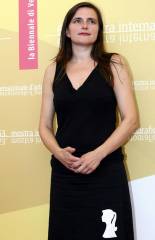
Svenska (English below):
Cinemateket visar en serie mer eller mindre nya österrikiska filmer och den första vi ser i denna serie är Fallen av Barbara Albert (också kallad 'Falling').
Detta är en film om ett antal kvinnor som varit mer eller mindre goda vänner sedan barndoms- eller ungdomsåren och som efter många år träffas igen på en begravning.
Under filmens gång avklädes deras inbördes relationer där man diskuterar gamla pojkvänner och andra personer med vilka man haft mer eller mindre nära relationer.
Även de politiska idealen diskuteras och efter att i ungdomsåren uppenbarligen haft vänstersympatier och varit en grupp 'radikala' unga kvinnor (vad detta uttryck kan sägas implicera), har de nu gått skilda vägar politiskt och socialt.
 En av kvinnorna är 'skådespelerska' även om detta visar sig till största delen implicera att 'dubba' röster till andra skådespelare i filmer.
En av kvinnorna är 'skådespelerska' även om detta visar sig till största delen implicera att 'dubba' röster till andra skådespelare i filmer.En annan av kvinnorna har haft sociala problem med droger bl.a. vilket gör att hon nu har fotboja och egentligen är förbjuden att träffa sin dotter, något hon trots allt ser till att göra.
Detta får, senare i filmen, konsekvenser för henne.
De andra kvinnornas historia avslöjas bit för bit och alla tycks de desillusionerade och frustrerade för att ej ha lyckats nå de mål i livet, vare sig socialt, karriärmässigt eller politiskt, som de en gång satte upp för sig själva.
Filmen lyckas dock inte få min eller Aurore's uppmärksamhet då det hela bygger mycket på dialogen dem emellan och förmågan att teckna intressanta personporträtt och det lyckas Barbara Albert ej med.
 English:
English:The film Aurore and I decided to see today at the Cinemateket was a relatively new Austrian film by Barbara Albert, called Fallen or Falling/Floating.
The film starts at a funeral where five women meet after not having seen each other in years. Gradually there separate lives are revealed and old conflicts concerning boy friends, acquaintances and lost ideals becomes a ground for conflict.
Apparently they where all 'radical' (whatever this word stands for) left-wing activists during their youth. Today some of them have left these ideals when living a different kind of life, more 'bourgeois'.
One of them is an 'actress' (actually meaning dubbing voices for films) and the other women are both impressed and very respectful towards her in the beginning but after a while her life tends to make some of her friends jealous towards her, even displaying some bitterness. She has 'betrayed' her political ideals according to one of the women.
Another woman have had social problems including drugs and/or alcohol abuse and is 'forbidden' to meet her daughter, a prohibition she ignores and this causes her problems at the end of the film.
They are all frustrated and disillusioned. Their political ideals are no longer a real option in todays politics and their careers and social lives have not turned out the way they wanted it to do. Does it ever?
 Unfortunately I felt - and so did Aurore - that this was a 'déja vu'-experience.
Unfortunately I felt - and so did Aurore - that this was a 'déja vu'-experience.
The film is also very dependent on the dialogue between the five women and the ability to create an interest for the different characters and their life stories.
In our opinion, Barbara Albert does'nt succeed in creating these interesting personal portraits, so essential for the plot.
(Photo poster copied from: http://graphics8.nytimes.com/images/2007/06/28/arts/29fall600.1.jpg)
(Photo Barbara Allen in black dress copied from: http://images.movieplayer.it/2003/10/25/barbara-albert-a-venezia-2006-per-presentare-falling-30211_medium.jpg)
 Unfortunately I felt - and so did Aurore - that this was a 'déja vu'-experience.
Unfortunately I felt - and so did Aurore - that this was a 'déja vu'-experience.The film is also very dependent on the dialogue between the five women and the ability to create an interest for the different characters and their life stories.
In our opinion, Barbara Albert does'nt succeed in creating these interesting personal portraits, so essential for the plot.
(Photo poster copied from: http://graphics8.nytimes.com/images/2007/06/28/arts/29fall600.1.jpg)
(Photo Barbara Allen in black dress copied from: http://images.movieplayer.it/2003/10/25/barbara-albert-a-venezia-2006-per-presentare-falling-30211_medium.jpg)
(Photo Barbar Allen copied from:http://img.listal.com/image/99527/180full-barbara-albert.jpg)
(Photo Barba Allen face copied from: http://www.movie-times.net/PICTURES/barbara_albert.edited.jpg)
No comments:
Post a Comment